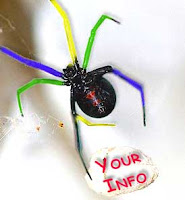The Hostile Takeover of the Social Web: Ground for conquest!

The Web is suppose to be just that; The Web. But today it looks like the Web is being redefined again by Web of Social Connectivities. This is subtle difference but a significant one and this is why:
The Web is foremost a physical architecture about distributed nodes that can be connected to each other directly through IP addresses. In this fundamental and original model, everyone can store information and access information stored on other nodes. Basically central storage is not required, and the information is controlled by its owner. But when search engines came about and crawled theses nodes to make a centralized index, a worrisome transformation occurred... information was copied, captured and ranked centrally. The search engines appeared as giant switchboards when in fact they copied everything and pointed out the sources of origin for us to access (you would be surprised at how many people don’t know that the Web is copied and stored by Google). We basically reverted to the mainframe model unbeknownst to us. And now come the Social Web where the connections about our private communities of interest are the next thing to be centralized and capitalized upon. Once again, as recently announced by Google, Bing, Facebook and Twitter our relationships and connections are being indexed and centralized to strengthen search at the expense of privacy.
Is this our only option to be connected and find information? The answer is “no”. In the late 90s and early 2000s many options where emerging that could have ensured privacy and leverage the Physical Web. Solutions like Groove, created by Ray Ozzie (also the creator of Lotus Notes), a peer-to-peer solution that only acted as an IP switchboard for content located on its users’ computers. Napster was also very successful at distributed file sharing but made the mistake to challenge record industry. Sun Microsystem has an open source peer-to-peer protocol called Jxta for developers to build such solutions. Many others who tried to build a Web of information routing that was true to the Physical Web have failed because they were disruptor to the mega-empires of centralized data and distribution channels that were emerging at the time. The record distribution industry was possibly the culprit of this mainframe vision tipping point (unbeknown to itself).
So if today you have not gone into your Facebook privacy settings and ensured that your web index is toggled off, your private information will be indexed by Google.
For some of my friends and colleagues who have been following my posts about privacy and my passion for organic peer-to-peer technology as the fightback model to centralized storage, now is the time to think about the creation of distributed indexes and routing technics that respect information ownership and permission sharing with its authors and communities.
The problem will get worst but the solution is within reach; that’s what is great about the Web. It will be adopted once people realize that their privacy and their networks are becoming a merchandise. Until then I will continue to promote alternatives that will evolve towards a truly distributed and privacy-friendly Web.


Comments